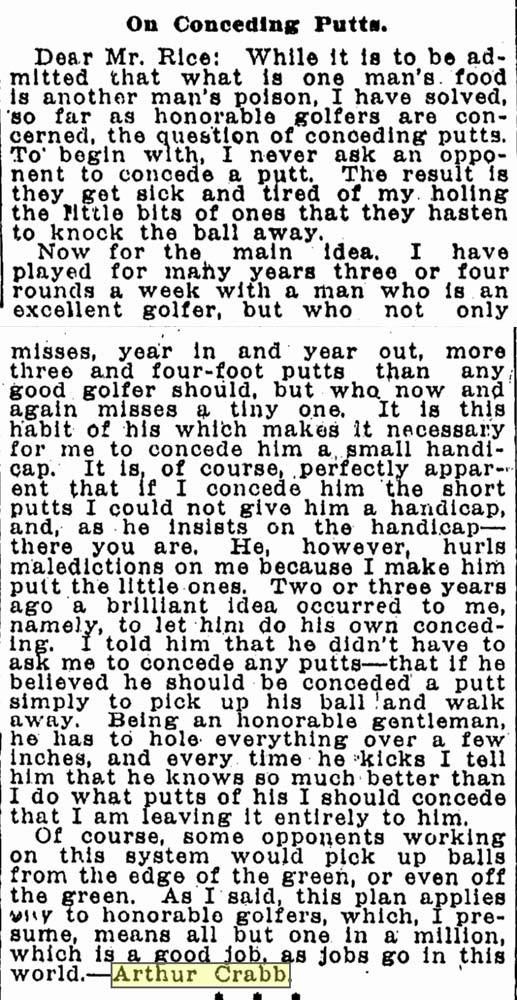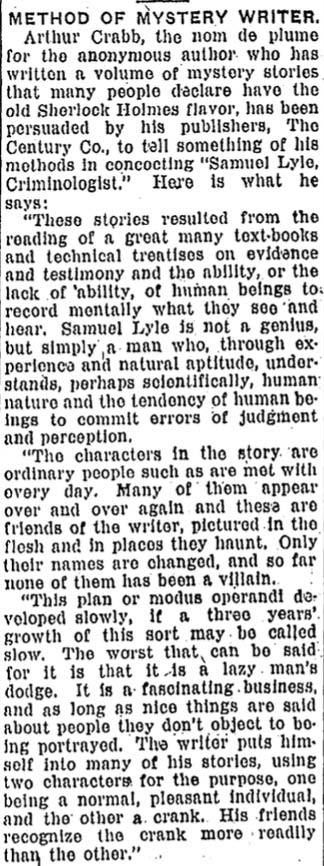What I enjoyed most about the story was the detailed description of how the golfers played the golf holes. In case anyone who read the article didn't figure it out, "Lanning Golf Club" was actually pseudonym for Merion East, and so the story gives some indication of how top club players played Merion, circa 1921. Given the distance today's better players hit the ball it is eye opening.
The other mystery is the author, "Arthur Crabb." "Crabb" wrote fiction (mostly mysteries) beginning in about 1917, and he published two novels, a thematic collection of mysteries, and (by one account) over a hundred short stories. (I've read the three books and dozens of the stories, but haven't found 100.) He was also a commentator on golf and (occasionally) football. His comments on golf were often witty, or at least they were intended to be. For example, here is his suggestion to Grantland Rice on how to handle the issue of when to concede putts:

For another example, in July 1921 "Crabb" sent the following rules question into American Golfer but the question was obviously just a setup to illustrate how the various options under the unplayable lie rule functioned:
GENTLEMEN: Will you kindly give a decision on the following point? A is playing in a medal play competition. He drives from the tee, gets a wild hook on his ball, and ends up in an abandoned well, four feet in diameter and six feet deep. The poor fool has a hunch that he can play the ball out of the well, and in a moment of delirium takes a crack at it. Then he wakes up and wonders what he can do. He could stay in the well for a hundred years and never get out, yet the rules apparently give him no option but to keep on dropping in the well. Of course you understand the well is perfectly dry and no question of water enters the case. The rule says that "he shall play his next stroke as nearly as possible to the spot from which the ball was played". It is a cinch to keep on dropping the ball in the well in just about exactly the same spot from which it was originally played. I shall appreciate it very much, if you will let me know how to get the poor goof out of the well. - Arthur Crabb.As for golf course architecture, he didn't have too much to say, but in May of 1935 he authored a strong critique of the use of water in an American Golfer article titled, "Water on the Golf Course: Outlining Some of the Objectionable Features in This Type of Hazard, Including Certain Rules Difficulties" which began:
FIRSTLY, it is very easy to just criticize; it is not so easy to criticize constructively. Secondly some of my so-called friends say that my idea of a golf course is a geometric figure, not an oil painting, that the esthetic, artistic and soulful qualities of a golf course have no appeal for me. They may be right, but I am obstinate enough to go on believing that, by and large, water on a golf course is a poor hazard.What followed was a reasonable critique of the problems (rules and otherwise) that arise when water is used as a hazard in golf, and a pretty strong indictment of the use of water on the famous 11th hole at Merion:
The Eleventh Hole at Merion which has achieved considerable publicity is in my humble opinion a fundamentally bad hole. Replace the water with sand and I believe it would be a good hole, if not a great one.As for "Crabb's" fiction, many of the stories are mysteries, or contain some element of mystery, but they also run the gamut from sappy romance to psychological profile, or both (such as in his novel Ben Thorpe, about a misogynist who ultimately falls for a young woman whom he had previously thought of as almost a sister.) His mysteries were often promoted as American Sherlock Holmes stories, although I suppose this was (and is) pretty common when it came to promoting mysteries.
Golf and golf clubs are featured in many of his stories, and many featured recurring characters in and about "Alden" ( which was Philadelphia) and its prominent golf clubs. According one account, the recurring characters are friends of the author, "pictured in the places they haunt." So the stories might give some insights as to the type of men and women that frequented these clubs at that time.
His mysteries often focused on misunderstandings and mistakes of perception, as described in this blurb from 1920:

But I am digressing. I had previously mentioned a "mystery" about the author. Well, "Arthur Crabb" was actually Richard Francis, a long time USGA Rules expert and author of one of the seminal books on the Rules of golf (which incidentally, contains an appendix supposedly written by Arthur Crabb.) Francis was also on Hugh Wilson's Construction Committee, which was charged with laying out and constructing the two courses at Merion. Crabb's second book,
Ghosts: A Samuel Lyle Mystery Story, was dedicated to Wilson.
If anyone is interested, I'll put together a list of links to some of his work.